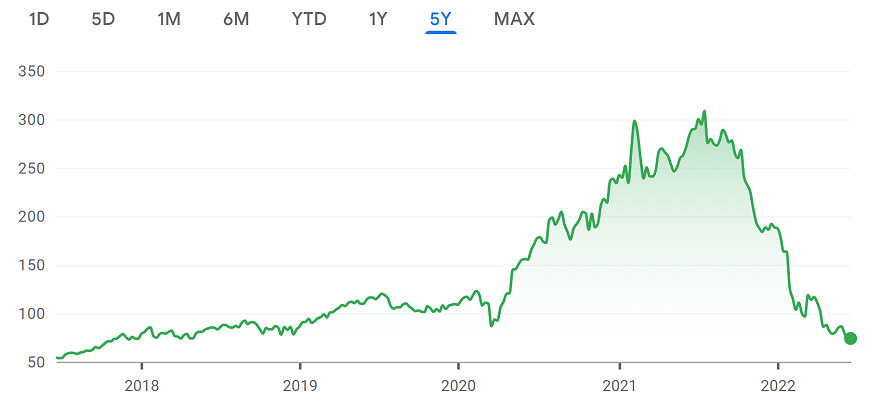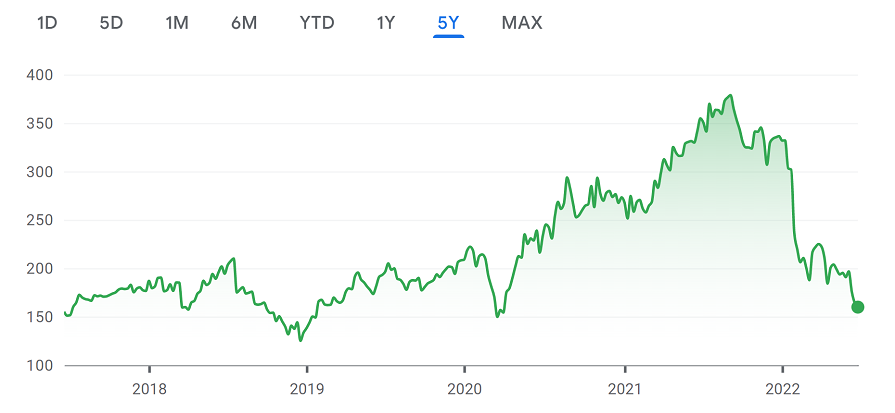If you ask any quality growth manager about their investment approach, one of the first things they will talk about is the concept of a business's ‘economic moat’. This can take many forms, such as a patent, brand or piece of intellectual property, but every one prevents competitors entering its owner's market and driving prices and margins down.
The benefit of investing in a company with a strong economic moat, also known as a barrier to entry, is evident from their longevity. For example, the average birth year of a company in Fundsmith Equity – the largest quality growth fund in the UK – is 1926.
Yet while some economic moats can last for longer than a century, they can also be created – and destroyed – within a matter of years. The growing power of the internet, cloud computing and mobile technology over the past decade or so has seen some tech companies start up, wipe out entire industries, then get disrupted themselves, in less time than it takes for the economic cycle to turn.
Below are two tech stocks that Stephen Yiu (pictured) of the LF Blue Whale Growth fund sold out of after they lost their moat.
PayPal
Yiu invested in PayPal when he launched LF Blue Whale Growth in 2017, but he said it has been one of the most controversial stocks in his portfolio, provoking more disagreements among his team than any other holding.
Other quality growth managers continue to rate the company highly – Terry Smith holds it in Fundsmith Equity and it is a top-10 holding in Nick Train’s Lindsell Train IT – and Yiu dramatically increased his position as recently as 2020.
“Before the pandemic, if you wanted to shop online outside the Amazon ecosystem, it was fairly likely that you’d use PayPal, because that's what gives you protection in terms of your credit card details. It had the first-mover advantage at the time,” he said.
“Then during the pandemic, it managed to win a lot of new customers, with many people who had never shopped online before signing up.”
In 2021, chief executive Dan Schulman extrapolated this surge in demand, predicting PayPal’s 377 million users would grow to 700 million by 2025.
However, Yiu disagreed, selling out of the stock early this year and calling it “structurally broken on multiple fronts”.
“We started to notice a few more competitors popping up on small merchants’ websites,” he said.
“Back in the old days, we would only see PayPal as a de facto button at the checkout. But since then, I've seen Amazon Pay in some, even though it's outside of the Amazon porthole, and others like Block, Stripe and Shopify. That made me realise that maybe it wasn’t that dominant.”
Performance of PayPal stock over 5yrs

Source: Google Finance
Yiu also became concerned by PayPal’s foray into new areas, including buy-now-pay-later and crypto trading, with a stock broking option also in the works.
While many tech companies have successfully expanded into new sectors, PayPal’s management doesn’t expect to make a profit from these new services. It is launching them in a bid to make customers more reliant on the app, hoping this will reduce the churn rate.
The final straw for Yiu was a rumoured $45bn acquisition of Pinterest. Although this eventually fell through, he said it suggested management had taken its eye off the ball.
“Of course, Pinterest has about 400 million users and this would quickly increase Paypal's user base from 300 million to 600 or 700 million,” he continued.
“But from our perspective, that is a distraction. Pinterest is a social media company and you definitely don't want to get into that area given all the scrutiny you have in that space.”
Yiu added: “It's not like one single thing was a deal breaker, but if you put them all together, it basically means the technology is not that great and many other companies have managed to replicate it, and even do it better. And the consumer certainly isn’t loyal to a particular payment technology.”
Meta (Facebook)
Reservations about social media were also behind Yiu’s decision to dump another holding – Meta, formerly Facebook. He had also held this stock since he launched the fund, and it was a top-10 holding as recently as October. Again though, he completely sold out of his position early this year.
Yiu said Meta’s business looks attractively valued today: he has high hopes for WhatsApp, and pointed out Facebook and Instagram remain dominant players in the digital advertising area.
However, he said founder Mark Zuckerberg’s focus on the metaverse – an immersive virtual world – hinted at fundamental problems for the company.
“The reason Zuckerberg is interested in the metaverse is because of the longevity of the business model,” the manager continued.
“If you think about who really controls our day-to-day activities now, it is basically Google Android and Apple iOS.
“What changed was Apple introducing its iOS 14.5 operating system, which lets the user stop apps from tracking their activity for targeted advertising. Basically, Facebook has got really disrupted and it could have seen this coming.”
In a recent article in The Financial Times, Eric Seufert, an adtech consultant, estimated Meta lost out on $8.3bn of revenue last year as a result of the change to privacy settings.
Performance of Meta stock over 5yrs

Source: Google Finance
Yiu said this change has made Facebook realise it needs to build a new operating system from scratch, which is why it spent $10bn last year on developing the metaverse. However, the manager said he wouldn’t be surprised if this figure rose to between $50bn and $100bn over the next 10 years – and even then, there would be no guarantee of success.
“The problem for us is, who is going to be the ultimate winner? If you start from scratch versus someone like Apple or Google – and even Microsoft is doing something in the metaverse – that might not be Meta.
“I think we can speak for many value managers and say Facebook is actually a value stock now – it is really cheap. But it's just how far do you have to look out and what certainty do you have in terms of what Metaverse is going to bring?”






